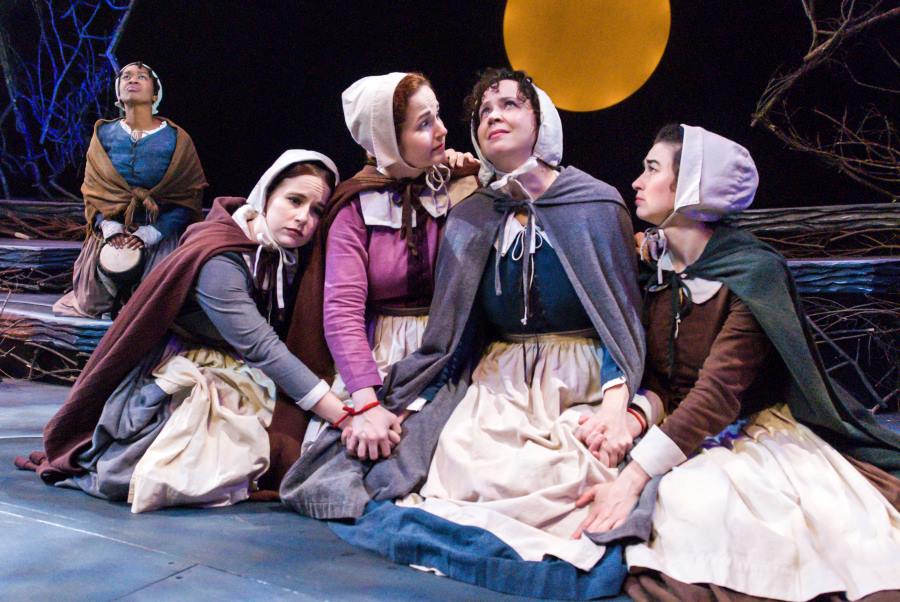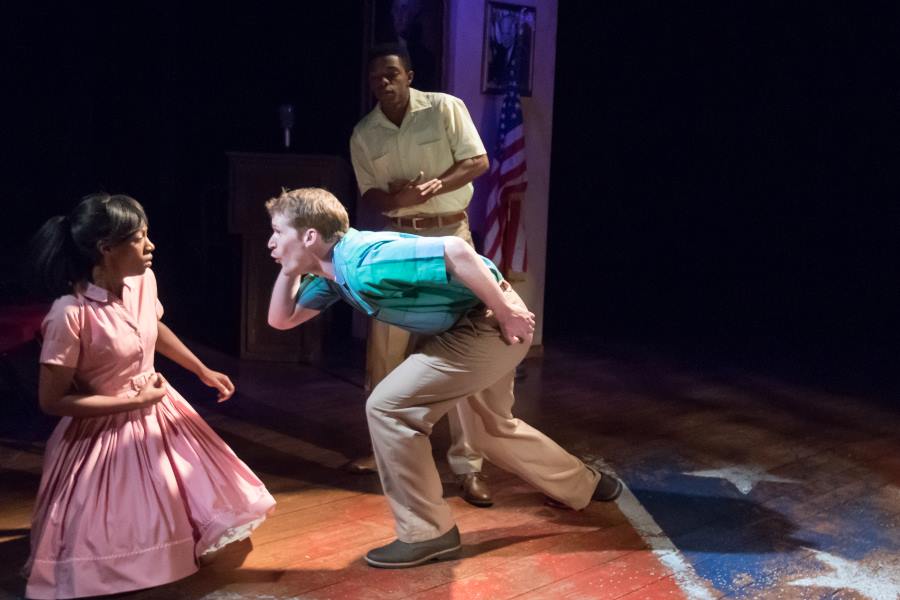Almost every political issue directly affects children. Education, health care, the environment—each has a huge impact on families and on the future. And as a Southern Poverty Law survey indicates, kids have a lot to say about politics and the presidential election. A Hillary Clinton ad reminds us that children are watching the campaign, and considering how media-savvy young people are today, they may be watching more now than they have during past elections.
Politics is making its way into theatre for young audiences (TYA) this campaign season on several fronts, with a number of plays riffing on political themes: Grace for President at Aurora Theatre in Lawrenceville, Ga., and Children’s Theater of Charlotte; Duck for President at Houston’s Main Street Theater; and Rock the Presidents at Childsplay in Tempe, Ariz. However, this trend is not a new one, as TYA has been engaging with big political issues for years. David Saar’s 1992 play The Yellow Boat is about a boy living with AIDS, and Gabriel Jason Dean’s 2011 play The Transition of Doodle Pequeno deals with immigration and gender identity. A number of shows this season are following in this tradition: posing big questions to kids and challenging them to come up with “grown-up” answers.
Coterie Theatre in Kansas City, Mo., opened its season with The Nine Who Dared: Courage in Little Rock, which runs Sept. 20-Oct. 21. Written by Wendy Lement, Derek Nelson, and Cliff Odle, the play is an interactive drama that tells the story of the Little Rock Nine, teenagers who in 1957 became the first African-American students to attend Central High School in Little Rock, Ark.
“In our state, we had the protests in Ferguson,” says Coterie’s producing artistic director Jeff Church, who’s directing The Nine Who Dared. “The same thing happened in Little Rock: mobs, violence, troops called in. Young people were called upon to be on the frontline of the integration battleground in Little Rock. It’s just right, in my opinion, to bring that to young people’s attention today.”
The play takes place at a town hall meeting, with the audience playing the role of the concerned Little Rock community. Toward the end of the show, audience members participate in a forum to decide if integration is worth the danger the students have been facing. “We’ve found it works for us to do plays for middle school audiences that aren’t ‘sit down, watch the play, get back on the bus,’” Church explains. “It’s not a field trip; it’s a field experience. Reflection about what they’ve seen and heard is built into the play in a very theatrical way.”
In theory school integration is no longer a controversial issue. Still, Coterie has had at least one school cancel their theatre trip due the play’s use of the “n” word. As the company explains on their website, the word is used “one time in the play, in an actual quote from one of the harassers, as verified in the memoir, Warriors Don’t Cry, by Melba Patillo-Beals.”
“We did not and cannot drop the word, which occurs in the climax of the play, right before the forum begins,” Church says. “Our disclosure caused this cancellation, but we still wouldn’t do it differently. I think we’re on the right side of opening up dialogue for these students. The sting of the word is felt when it is deployed effectively, in the right place.”
In New Haven, Conn., Collective Consciousness Theatre will tour Stories of a New America to Connecticut school and community venues in spring 2017. Created in partnership with Integrated Refugee and Immigrant Services in 2011, Stories of a New America features excerpts from interviews the company conducted with more than 100 refugees, many from the Middle East, the Congo, and other war-torn regions.
“We wanted to know how they got here and what their journey was,” says Collective Consciousness’s executive artistic director, Dexter J. Singleton. “All of them had to deal with suddenly having their lives uprooted and changed forever. How did they remain so strong in the face of such danger?”
The interview process took longer than a year and a half, and required the help of translators working in more than a dozen languages. “Many of the stories were funny, heartbreaking, joyous, and remarkable,” says Singleton. “We whittled [the interviews] down to the ones we thought best captured the heart of what it means to be a refugee in America. We’re proud of the fact that every single word of the play is from their words. We just shaped it into a clear narrative that all people can relate to.”
The diverse cast features American and refugee actors, and the play includes several different languages. Singleton observes that kids have responded enthusiastically to the play over the years, and emphasizes the value of bringing refugee stories to children.
“I think it’s always important for young people to hear the stories of refugees so that they can learn about the effects of wars and conflicts,” he says. “They can learn empathy and develop a greater understanding of people’s lives that are different from their own. Unfortunately, the play is still timely, as the prejudice and lack of empathy toward refugees in America has gotten worse.”

Nashville Children’s Theatre is confronting issues of gender and social repression with its production of Laurie Brooks’s Afflicted: Daughters of Salem, which runs Sept. 15-Oct. 2. Commissioned by Coterie, where it premiered in 2014, Afflicted depicts the events leading up to the Salem witch trials from the perspectives of young female accusers.
“Very little is known about the young women who made the accusations, and so it’s fascinating from an historical perspective,” says Alicia Fuss, NCT’s director of education and the production’s director. “What might have led them to make these accusations? What might have been their motive? It’s also a script that brilliantly taps into the nuances of teenage female friendship.”
Like The Nine Who Dared, Afflicted also includes a forum component, calling on the audience to help determine the story’s final outcome. “The more I worked with the script, the clearer it became to me that it’s not really a post-show forum—it’s the end of the play,” says Fuss. “Without it, the play has no falling action or resolution. My hope is that it provides a springboard for more intimate conversation between the friends and families that attend the show together. I also think that we don’t spend enough time listening to young people. In the forum, the youth are directly asked to share their ideas. Suddenly the characters they’ve been listening to for an hour are turning to them for their thoughts. That’s a very powerful framework.”
Fuss also notes how the issues facing the young women in the play have moved her to rethink adult attitudes towards children.
“As an adult, this play has pushed me to think about the restrictions and influences we place on our young people today, and what the ramifications of those might be,” she says. “I think it shows the adults in the room how very capable the youth are at thinking through both the historical event and the applications to their contemporary lives.”


